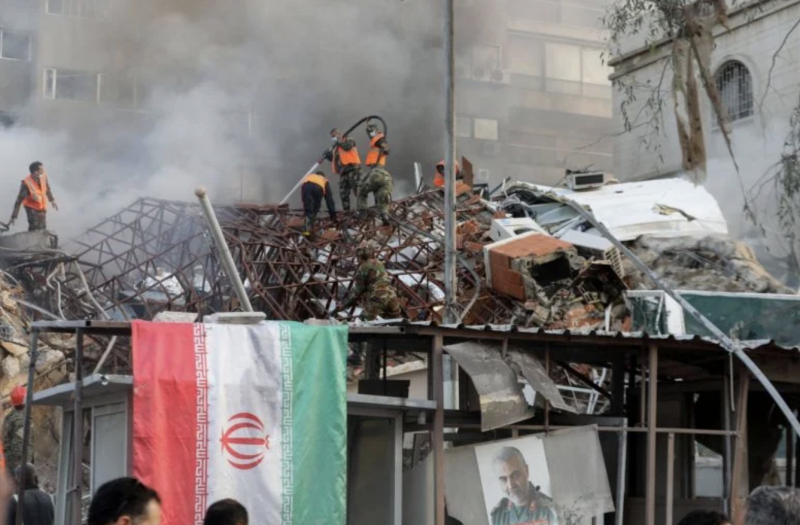
Rescue workers and security guards fighting a fire after the strike that destroyed an annex of the Iranian embassy in Damascus, killing several people including a senior Revolutionary Guard official, April 1, 2024. (Credit: Louai Beshara/AFP)
Between Bashar al-Assad and Iran, there is a before and after Oct. 7. The Islamic Republic is increasingly under fire from Israel in Syria, notably the attack on Iran’s consulate annex building in Damascus on April 1, which killed Mohammad Reza Zahedi, a senior military official in the Iranian Revolutionary Guard's Quds Force.
Nevertheless, the Syrian president refuses to take action. L’Orient-Le Jour learned from sources close to the “Axis of Resistance” that Assad is opposed to the idea of Iran retaliating from Syria.
When Iran was still considering its response to Israel, a major operation from Syrian territory to destroy Israeli military sites and infrastructure in the occupied Golan Heights was considered, L’Orient-Le Jour learned from the same sources. Since a diplomatic representation had been targeted on Syrian soil, it seemed logical for Iran to respond from Syrian territory.
During discussions with Syrian officials, Tehran referred to an infiltration operation in the occupied Golan Heights and the Syrian Army seizing back a piece of territory considered Syrian under international law.
Assad, however, opposed this option. The Syrian president — who wants to keep his regime out of the war that has been shaking the region since Oct. 7 — argued that such an action could not be carried out without close coordination with Russia, his other sponsor. While he is still seeking to retake Idlib province from opposition forces, Assad believes that any action from his territory would weaken the Syrian Army on this front.
Suspicion and investigations
Although Tehran finally opted to retaliate from its territory on Saturday, the Syrian regime’s refusal widened the existing gap between Damascus and Tehran since the start of Operation al-Aqsa Flood. The Syrian president has not forgotten that Hamas — backed by the Islamic Republic — supported the Syrian revolution, which was bloodily suppressed.
Faced with “the unity of fronts” principle within the “Axis of Resistance,” Assad received Israeli and US warnings through various channels at the start of the war in Gaza. The message was clear: If he decided to open the Syrian front to allow Tehran and its regional proxies to launch operations against Israel, the retaliation would be aimed at him personally and his regime would be overthrown.
From then on, Assad stayed out of the war. Iran’s allies limited themselves to a few operations from south Syria, to which Israel responded.
Assad’s refusal to allow Iran to retaliate from his territory on Saturday thus reflected a desire to maintain this position to avoid a costly confrontation with the US or Israel.
But Israel’s strike on Tehran’s consulate annex building in an affluent Damascus neighborhood has rekindled Iran’s suspicions that the regime may be cooperating with its enemies.
In a bid to weaken the Iranian presence in Syria, Israel is targeting Iranian officials or their military deployment zones in Homs, in the vicinity of the Sayeda Zeinab neighborhood, in Damascus’ southern suburb. In addition, it has been targeting them in the capital and the border areas between Syria and Iraq as well as Aleppo.
The intensified targeted assassinations attributed to Israel since Oct. 7 have created suspicions between Syria and Iran.
L’Orient-Le Jour learned from the same sources that numerous investigations were conducted into possible infiltration into the ranks of security officials in Syria — both before and especially after April 1 — prompting Assad to make replacements in key positions.
These changes have given rise to debate among analysts. Some believe that Assad was aiming to strengthen those close to Iran. Others saw it as a marginalization in favor of figures close to Russia.
On the political front, the Syrian president continues to collaborate with Moscow and Arab countries to stay out of the war. Despite his opposition to any Iranian retaliation from Syria, Assad stressed his commitment to maintaining good relations with Iran, pointing to the need for continued coordination.
This article was originally published in L'Orient-Le Jour. Translated by Joelle El Khoury.